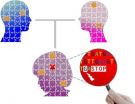How long should HCV treatment last? Study suggests answers are complex
Translational researchers tracked in real-time how virus replicates and how drug clears HCV from liver, plasma
2014-05-28
(Press-News.org) BUFFALO, N.Y. – As new treatments for hepatitis C virus (HCV) are approved, biomedical scientists are exploring their mechanisms and what they reveal about the virus. An online publication this month in Hepatology is the first to report real-time tracking of viral decay in the liver and blood in 15 patients with HCV.
Led by Andrew H. Talal, MD, University at Buffalo professor of medicine in the Division of Gastroenterology, Hepatology and Nutrition and corresponding author, the study is the first to trace in real-time how the drug telaprevir inhibits viral replication in the liver and how it clears HCV from infected cells and plasma of infected patients.
The study was sponsored by Vertex Pharmaceuticals, which makes telaprevir, an HCV protease inhibitor.
"Our findings begin to define for how long patients may need to be treated in order to achieve viral eradication," explained Talal.
"There has been no precise definition of the duration of treatment based upon serial measurements of the virus in the liver," said Talal. "This is the first time that serial measurements in the liver have been performed during antiviral therapy."
In previous studies, a more invasive procedure – core needle biopsy – was used to sample the liver in HCV infection. In the current study, fine needle aspiration was used; this method is better tolerated by patients and allows for repeated sampling at more time points than core needle biopsy.
"Fine needle aspiration enables us to sample the liver repeatedly during the course of treatment, to better understand what's happening with the virus, how these drugs work and how to tailor therapy to the patient," Talal explained.
In the study, conducted at Weill Cornell Medical College in New York City, 15 patients with chronic HCV infection were treated with telaprevir-based triple therapy (consisting of telaprevir/pegylated interferon alfa/ribavirin), an HCV treatment regimen that was approved by the Food and Drug Administration in 2011.
Fine needle aspiration of the liver was performed before treatment on all 15 patients and at these intervals following treatment: ten hours, on days 4 and 15, and at week eight. Viral kinetics, resistance patterns, drug concentrations and host transcription profiles were measured.
Of particular interest were the study's findings regarding the rate of decay for viral ribonucleic acid (RNA), an indicator of how quickly the virus is being eradicated.
"We found that HCV RNA decay in the liver lagged behind that in the peripheral blood, which has implications for how long the virus may persist in the body and the possible duration of treatment needed," said Talal.
They also found higher levels of the drug in blood than in the liver.
"These findings can affect the duration of therapy," said Talal, adding that they can also help to identify when drug-resistant variants of the virus emerge in blood and in the liver.
The findings also may have relevance to the development of other methods of treating HCV, such as vaccines that could be used to control the infection, he added.
Talal conducts research on HCV in the Clinical and Translational Research Center in the School of Medicine and Biomedical Sciences and he sees patients as a physician with UBMD, the physician practice plan of the UB medical school. Talal has had additional research projects funded by Vertex Pharmaceuticals.
INFORMATION:
In addition to Talal, who has an adjunct appointment at Weill Cornell, co-authors of the paper are: Rositsa B. Dimova, PhD, research assistant professor in the departments of medicine and biostatistics at UB; Marija Zeremski, PhD, senior research associate at Weill Cornell and research assistant professor of medicine at UB; Christine M. Cervini, RN, staff associate in medicine and Ira M. Jacobson, MD, chief of the division of gastroenterology and hepatology, both of Weill Cornell; Eileen Z. Zhang, Min Jiang, Marina S. Penney, James C. Sullivan, Martyn C. Botfield, Ananthsrinivas Chakilam and Rishikesh Sawant, all of Vertex Pharmaceuticals and Ann D. Kwong, of InnovaTID Pharmaceuticals, formerly of Vertex Pharmaceuticals. Jacobson has served as a paid consultant to Vertex.
ELSE PRESS RELEASES FROM THIS DATE:
Study affirms value of epigenetic test for markers of prostate cancer
2014-05-28
A multicenter team of researchers report that a commercial test designed to rule out the presence of genetic biomarkers of prostate cancer may be accurate enough to exclude the need for repeat prostate biopsies in many — if not most — men.
"Often, one biopsy is not enough to definitively rule out prostate cancer," says study researcher Jonathan Epstein, M.D., director of the Division of Surgical Pathology and a professor of pathology, urology and oncology at the Johns Hopkins University School of Medicine. "Our research finds that by looking for the presence or absence ...
Women's contraceptive use influenced by contraception education and moral attitudes
2014-05-28
COLUMBIA, Mo. – Nearly half of all pregnancies in the United States are unintended, and unplanned pregnancies are associated with poorer health and lower rates of educational and economic achievement for women and their children, according to the Centers for Disease Control and Prevention. However, research shows that the desire to avoid pregnancy does not necessarily increase women's use of contraceptives, although this discrepancy is not well understood. Now, MU researchers have found that levels of prior sex education and moral attitudes toward contraception influence ...
Toxins in the environment might make you older than your years
2014-05-28
Why are some 75-year-olds downright spry while others can barely get around? Part of the explanation, say researchers writing in the Cell Press journal Trends in Molecular Medicine on May 28, is differences from one person to the next in exposure to harmful substances in the environment, chemicals such as benzene, cigarette smoke, and even stress.
While the birth date on your driver's license can tell you your chronological age, that might mean little in terms of the biological age of your body and cells. The researchers say that what we need now is a better understanding ...
Cocktail party neuroscience: Making sense of voices in a crowd
2014-05-28
This news release is available in French. Listening to a conversation in the context of a cocktail party presents a great challenge for the auditory system. Without realizing it, one must extract, from a complex mixture of sound, the sound of a single voice to understand and track it. Researchers at Queen's University, lead by Dr. Ingrid Johnsrude, are studying how our brains meet that challenge, and allow us to distinguish specific voices in crowded, noisy and distracting environments. Her studies have revealed that the brain does not simply rely on the incoming ...
New research shows memory is a dynamic and interactive process
2014-05-28
This news release is available in French. Research presented by Morris Moscovitch, from the Rotman Research Institute at the University of Toronto, shows that memory is more dynamic and changeable than previously thought. Dr. Moscovich's results reveal that important interactions between the hippocampus and the neocortex, two regions of the brain, have different yet complementary roles in remembering places and events. These results highlight that different forms of memories exist in the brain, and that these are encoded in different, but interacting parts of the ...
Uncovering clues to the genetic cause of schizophrenia
2014-05-28
NEW YORK, NY (May 21, 2014) — The overall number and nature of mutations—rather than the presence of any single mutation—influences an individual's risk of developing schizophrenia, as well as its severity, according to a discovery by Columbia University Medical Center researchers published in the latest issue of Neuron. The findings could have important implications for the early detection and treatment of schizophrenia.
Maria Karayiorgou, MD, professor of psychiatry and Joseph Gogos, MD, PhD, professor of physiology and cellular biophysics and of neuroscience, and their ...
A path toward more powerful tabletop accelerators
2014-05-28
Making a tabletop particle accelerator just got easier. A new study shows that certain requirements for the lasers used in an emerging type of small-area particle accelerator can be significantly relaxed. Researchers hope the finding could bring about a new era of accelerators that would need just a few meters to bring particles to great speeds, rather than the many kilometers required of traditional accelerators. The research, from scientists at the U.S. Department of Energy's (DOE) Lawrence Berkeley National Laboratory (Berkeley Lab), is presented as the cover story in ...
PTSD treatment cost-effective when patients given choice
2014-05-28
A cost-analysis of post-traumatic stress disorder treatments shows that letting patients choose their course of treatment – either psychotherapy or medication – is less expensive than assigning a treatment and provides a higher quality of life for patients.
In a recent study, published in the Journal of Clinical Psychiatry, PTSD patients allowed to choose between therapies ended up costing about $1,622 less on average per patient per year compared with patients who were assigned treatment. Among patients not given a choice, treatment with prolonged exposure psychotherapy ...
Technology marketers should take consumer life-cycle into account: New Rotman study
2014-05-28
Toronto – If you want grandpa to start using the bank machine instead of standing in line for the teller, the best way to do it is to tell him to "Act now!" with a limited time offer for a banking card, shows new research.
A new study from the University of Toronto's Rotman School of Management suggests marketers should pay attention to where consumers are in their lifecycles when determining how to get them to adopt new technologies.
Marketers may have incorrectly assumed that older consumers avoid products such as debit or credit cards because they are technophobic ...
Supersonic spray delivers high quality graphene layer
2014-05-28
A simple, inexpensive spray method that deposits a graphene film can heal manufacturing defects and produce a high quality graphene layer on a range of substrates, report researchers at the University of Illinois at Chicago and Korea University.
Their study is available online in the journal Advanced Functional Materials.
Graphene, a two-dimensional wonder-material composed of a single layer of carbon atoms, is strong, transparent, and an excellent conductor of electricity. It has potential in a wide range of applications, such as reinforcing and lending electrical ...
LAST 30 PRESS RELEASES:
Microbe exposure may not protect against developing allergic disease
Forest damage in Europe to rise by around 20% by 2100 even if warming is limited to 2°C
Rapid population growth helped koala’s recovery from severe genetic bottleneck
CAR-expressing astrocytes target and clear amyloid-β in mouse model of Alzheimer’s disease
Unique Rubisco subunit boosts carbon assimilation in land plants
Climate change will drive increasing forest disturbances across Europe throughout the next century
Enhanced brain cells clear away dementia-related proteins
This odd little plant could help turbocharge crop yields
Flipped chromosomal segments drive natural selection
Whole-genome study of koalas transforms how we understand genetic risk in endangered species
Worcester Polytechnic Institute identifies new tool for predicting Alzheimer’s disease
HSS studies highlight advantages of osseointegration for people with an amputation
Buck Institute launches Healthspan Horizons to turn long-term health data into Actionable healthspan insights
University of Ottawa Heart Institute, the University of Ottawa and McGill University launch ARCHIMEDES to advance health research in Canada
The world’s largest brain research prize awarded for groundbreaking discoveries on how we sense touch and pain
Magnetofluids help to overcome challenges in left atrial appendage occlusion
Brain-clearing cells offer clues to slowing Alzheimer’s disease progression
mRNA therapy restores fertility in genetically infertile mice
Cloaked stem cells evade immune rejection in mice, pointing to a potential universal donor cell line
Growth in telemedicine has not improved mental health care access in rural areas, study finds
Pitt scientists engineer “living eye drop” to support corneal healing
Outcomes of older adults with advanced cancer who prefer quality of life vs prolonging survival
Lower music volume levels in fitness class and perceived exercise intensity
Of crocodiles, counting and conferences
AERA announces 2026 award winners in education research
Saving two lives with one fruit drop
Photonic chips advance real-time learning in spiking neural systems
Share of migratory wild animal species with declining populations despite UN treaty protections worsens from 44% to 49% in two years; 24% face extinction, up 2%
One in 20 babies experiences physical abuse, global review finds
Tundra tongue: The science behind a very cold mistake
[Press-News.org] How long should HCV treatment last? Study suggests answers are complexTranslational researchers tracked in real-time how virus replicates and how drug clears HCV from liver, plasma




